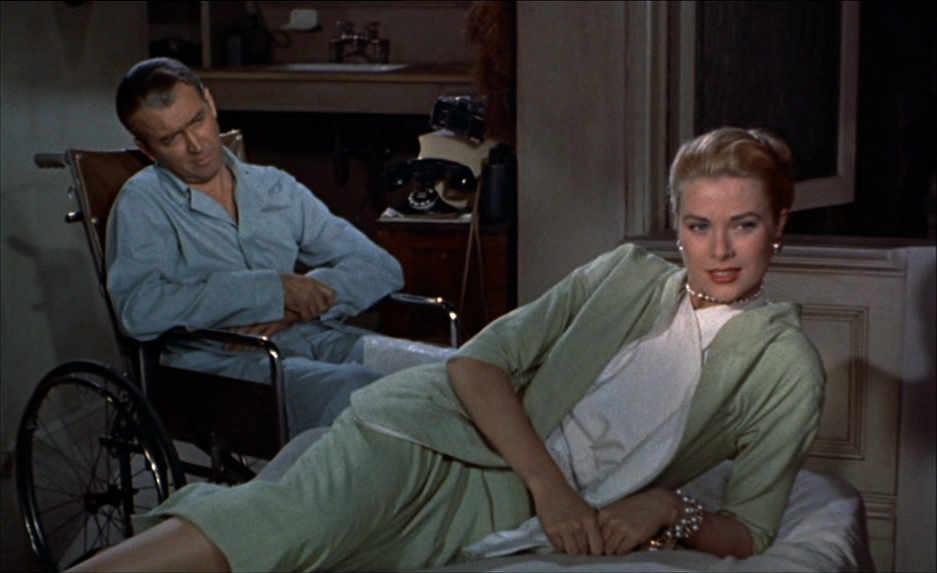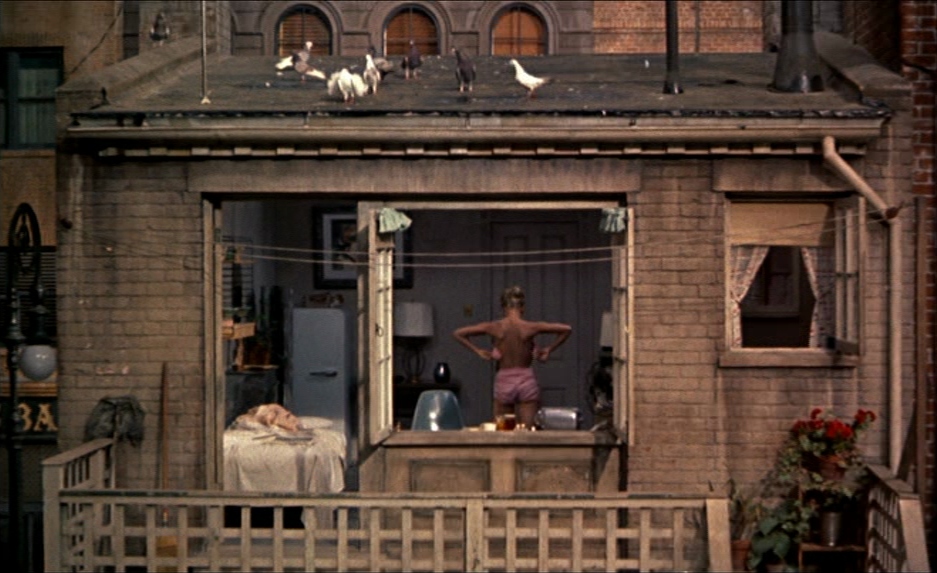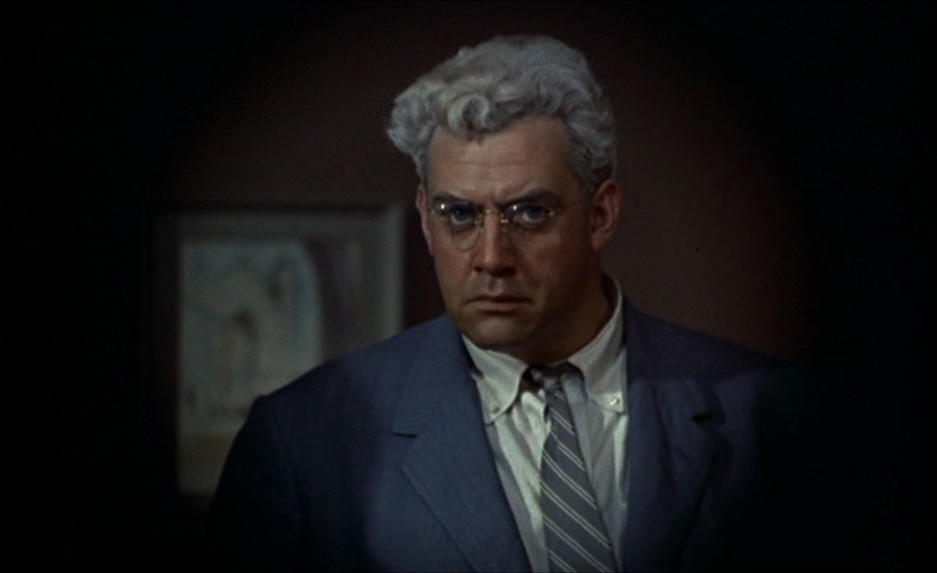

“Intelligence. Nothing has caused the human race so much trouble as intelligence.”
Alfred Hitchcock directed over fifty feature films and is one of the most influential directors in the history of cinema. He developed a cinematic language (“Hitchcockian”) that is frequently borrowed and occasionally stolen outright. One of his best is Rear Window. Mostly limited in location to a single apartment, the film tells the story of a laid up photographer who grows suspicious of one of his neighbors as he spends weeks observing the community’s activities through his back window. Starring James Stewart and Grace Kelly, who play off one another with incredible chemistry, the film is a masterclass in screenwriting and direction as it plays with the theme of voyeurism.
Rear Window has been analyzed to death. In one of my film classes we went through the whole gamut of angles through which to view it—male gaze, voyeurism, allegory, etc.—but only the voyeuristic aspect is needed for the film to work. That we have a tendency to take perverse delight in watching others without them knowing of our presence is what gives the film its frantic tension At first, Jeffries (Stewart) is chastised for the behavior by everyone who visits him. When Stella (Thelma Ritter)—the insurance agency nurse—realizes what Jeffries has been up to all these weeks while sitting alone in his apartment with a broken leg, she tells him, “In the old days, they’d put your eyes out with a red hot poker.” His girlfriend Lisa (Grace Kelly) and his old war buddy Doyle (Wendell Corey) similarly admonish him. Doyle holds out the longest, because his career as a detective informs his thinking, but the other two readily fall into Jeffries line of thinking: that Mr. Thorwald (Raymond Burr) has murdered his wife.

In addition to roping the viewer into the act of gleefully spying on the neighbors, the film is a classic because of its excellent characters. L.B. Jeffries is as compelling a character as you will find in cinema, and the clever ways in which Hitchcock fills in his personality are nothing short of masterful. In the opening scene, before a single line of dialogue is spoken, we already know a lot of information about him. We are shown his cast (he is injured), his broken camera (he was in an accident while holding the camera), several action photographs on the wall (he takes risks), a photo negative of a woman and a stack of magazines featuring the image (he is a successful photographer). So, when he speaks with his editor on the phone a moment later, although their conversation fleshes out his career aspirations, the camera is free to wander the windows of the surrounding apartments, as Jeffries ogles Miss Torso (Georgine Darcy) and scans the other apartments, lingering on the Newlyweds (Rand Harper and Havis Davenport), Miss Lonelyhearts (Judith Evelyn), and the songwriter (Ross Bagdasarian).
By the time Jeffries becomes concerned that Throwald has done something suspicious, we already have half-formed opinions about many of the neighbors, even though we haven’t heard any of them speak. James Stewart somehow manages to convince us that his character’s behavior isn’t creepy at all and is a natural response to being cooped up for six weeks. When Stella comes to check up on him, and later, when Lisa visits, his thoughts are dominated by his obsession with his neighbors.

Blended seamlessly with the mystery of Thorwald’s wife is the romantic subplot between Jeffries and Lisa. Similar to Stewart’s George Bailey in It’s a Wonderful Life, the central conflict in the romance is his desire to see the world. As a top-flight photographer, he will live from his suitcase, while Lisa prefers to wear a new dress every day and eat at the finest restaurants. She loves him, but she is losing patience with his deliberation. “She’s too perfect, too talented, too beautiful, and too sophisticated,” he tries to explain when he needs an excuse for why he hasn’t proposed to her yet. He implies an ultimatum when he contrasts the living conditions of his profession with her preferred tastes, and she meets it by showing up to his apartment the next night with a tiny little suitcase that fits all of her necessities.
Lisa is also eager to prove her resourcefulness to Jeffries. When Doyle initially dismisses the idea that Jeffries witnessed the murder of Mrs. Thorwald, Lisa has the chance to be the hands and feet of the immobile photographer, putting herself in danger by investigating while Jeffries watches in helpless suspense. And Rear Window is incredibly suspenseful. Some films made during earlier eras lose some of their cinematic power in the ensuing decades, but this Hitchcock thriller has lost none of its tension and will have you gripping the couch cushion tightly (several people I watched the film with recently even chose to avert their eyes during some of the climactic scenes). Although there are only a few main cast members, the rich tapestry of minor threads of the neighbors going about their mundane lives is curiously engrossing, highlighted by the eventual romantic match between the songwriter and Miss Lonelyhearts.

The stylistic innovation is noteworthy, but the real workhorse of the film is the acting of Stewart and Kelly. It may be Stewart’s most impressive role (though I have not seen them all), as he is forced to act primarily with his eyes, facial expressions, and voice. Couple that with the fact that he is playing against type, since he usually portrayed a moral, affable gentleman, and his performance is clearly excellent. Kelly is as perfect as the optimistic Lisa, countering the sour moods of Jeffries with smiles and considered argumentation.
By now, voyeurism in film has been done plenty of times, but it remains an interesting analogy for the act of moviegoing itself. From Peeping Tom (1960) to The Conversation (1974) to Blue Velvet (1986), it’s a theme that many filmmakers find fascinating and alluring. One could easily spiral into a very meta analysis of this aspect of the Rear Window. It’s there in many of Hitchcock’s films, such as North by Northwest, Psycho, and The Trouble with Harry. It’s an interesting way to think of narrative film as a medium, as an outlet for our own desire for occasional voyeurism, but to me it isn’t singularly compelling. Granted, there is a reason that characters don’t often look directly into the camera, but Hitchcock’s films only partially work as a commentary on our subconscious desires. It can be used to heighten tension—which Hitchcock knew and utilized to great effect frequently—but I do not think that it necessarily gives rise to some great epiphany about human nature.
So yeah, it makes a point of its voyeurism, but that has not led to its sustained success. It is still a classic more than six decades later because it is simply an incredibly well-made film. The single location setting is noteworthy, as is the writing which covers a lot of ground through concise dialogue, allowing the narrative to feel larger than the protagonist’s apartment. It is a perfect introduction to what makes Hitchcock tick, and a magnificent entry point into an older era of filmmaking.